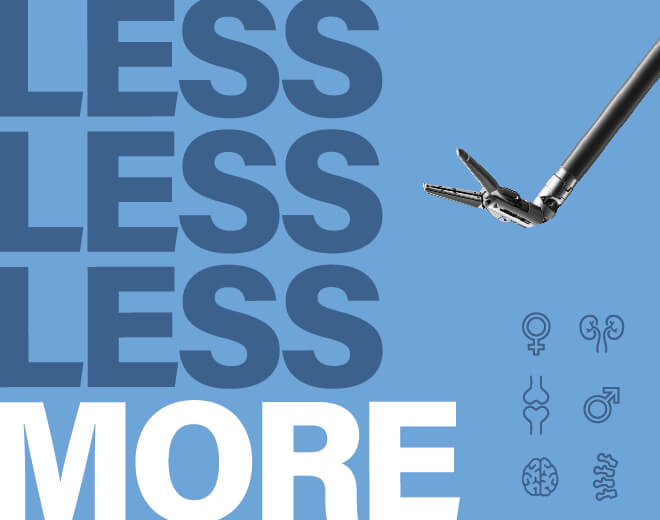Robotic Surgery
Robotic surgery and computer-assisted surgery are procedures that use robotic systems to aid surgeons when performing operations. Robotic surgery often means a shorter recovery time and smaller incisions.
Is Robotic Surgery Right for you?
Talk with your doctor to find out if you are a candidate for robotic surgery. Here are some things to consider when deciding if a robotic procedure could be the right choice for you:
- You want to avoid having a large or multiple incisions that could cause scarring.
- You do not want a long hospital stay.
- You want to minimize blood loss and avoid the need for a blood transfusion during surgery.
- You would prefer to limit the amount and duration of pain medications following surgery.
- You want to minimize the risk of infection following surgery.
- You want to know about surgical options that may provide better overall clinical outcomes and quicker return to everyday activities.
If you or a loved one has been diagnosed with a condition that may require surgery, you owe it to yourself to learn about all your options, including some of the most non-invasive surgical treatments available using robotic surgery. Some of the potential benefits of this type of surgery include:
- Less pain
- Decrease in blood loss
- Less scarring
- Fewer complications
- Shorter hospital stay
- Shorter recovery time
- Faster return to normal daily activities
- Better clinical outcomes
Minimally Invasive Robotic Surgery
When you choose robotic surgery, you’re choosing one of the least invasive surgical treatments available today. Robotic surgery offers the potential for you to experience less pain and bleeding, fewer complications and a faster recovery time. At Palm Beach Health Network, our surgeons are highly experienced in the art of robotic surgery so you can trust you’re in good hands. We offer robotic surgery for the heart, gallbladder, colorectal conditions, prostate, lungs, weight-loss surgery, gynecological procedures and more.
What to Expect After Robotic Surgery
Once you’ve had your procedure, you will be monitored in the recovery room. Many patients only spend one night in the hospital. You may experience some soreness from the surgery and should ask the staff for pain medication as needed. Be sure to discuss with your physician and care team about what you should expect immediately after surgery.
Once you are ready for discharge, you’ll receive instructions. Pain and soreness should resolve over the course of days or weeks, and pain medication should be taken as needed. At home, make sure to stay hydrated and eat a bland diet with small, frequent meals. It is also important to walk several times per day, increasing the distance each time.






